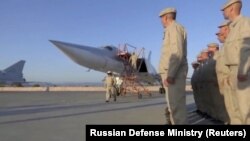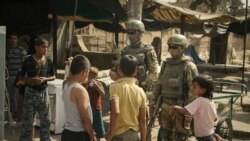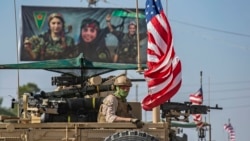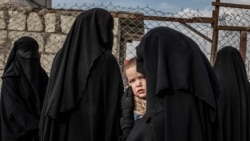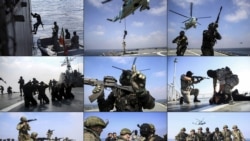The Russian Defense Ministry hosted the 9th Moscow Conference on International Security (MCIS) on June 22-24. As some 600 defense and diplomatic officials countries gathered in the capital to discuss global security issues, Russian officials used the international stage to boast about their country’s military intervention in Syria.
Security Council Secretary Nikolay Patrushev claimed Islamic State was defeated thanks to Russia and Syria, accusing unnamed countries of hindering Russia’s fight against terrorism.
“Fighting side by side, our troops and Syrian troops dealt a powerful blow to the terrorists, who were planning to create a global caliphate in Eurasia,” Russia’s TASS news agency quoted Patrushev as saying.
“During those difficult months, Russians, together with the brotherly nation of Syria, did not just fight for the future of Syria, they fought for the whole world that terrorists were acting against.”
Patrushev added: “It is regrettable that certain states claiming to have the status of major powers did not consider it necessary to stand together with us against this evil, and they even made a great deal of effort to hinder the fight against it.”
Patrushev’s claims are highly misleading.
Russia intervened militarily in Syria in September 2015 in large part to rescue its ally Bashar al-Assad, whose regime had been losing ground for years to opponents despite a helping hand from Iran’s Islamic Revolutionary Guard Corps (IRGC).
Although Russian and Syrian government forces did operate against Islamic State (IS) in areas west of the Euphrates River, a U.S.-backed international coalition, with Kurdish forces taking the lead on the ground, already was at war with the would-be caliphate in eastern Syria and Iraq.
Some of Russia’s first airstrikes in Syria reportedly were not against IS but aimed at Syrian opposition forces, including a CIA-backed group, according to U.S. officials, media and scholarly accounts.
Early on, Russia claimed its warplanes “performed high accuracy strikes against international terrorist organization [Islamic State],” and its defense ministry posted a video online showing airstrikes targeting what it said were IS locations.
The Russian air attacks intensified when IS claimed responsibility for a November 2015 bombing of Russian airliner over Egypt, killing 224 passengers and crew. But along with IS, the air campaign struck at anti-Assad forces and even civilian targets.
At the start of Russia's campaign, then-U.S. Secretary of State John Kerry met with the Russian Foreign Minister Sergey Lavrov at the United Nations Security Council in New York to discuss military coordination in Syria. Kerry expressed concerns “about the nature of the targets, the type of targets, and the need for clarity with respect to them.”
“It is one thing obviously to be targeting (Islamic State),” Kerry said. “We’re concerned, obviously, that is not what is happening.”
A year earlier, in 2014, the U.S. had launched its campaign to form the Global Coalition to Defeat IS, with international allies and local partners in Iraq and Syria.
Although the U.S. and Russia have worked to avoid accidental military conflict in Syria, Russia was never a member of the coalition. In 2016, a report by the Reuters news agency alleged that Russia had actually been sending homegrown Islamist radicals to Syria.
Some ended up joining jihadist groups – the terrorists Russia later claimed to be against. According to the news agency, this program began ahead of the 2014 Sochi Olympics, out of fear the games might come under attack.
“By December 2015, some 2,900 Russians had left to fight in the Middle East, Alexander Bortnikov, director of the FSB, the Russian security service, said at a sitting of the National Anti-terrorist Committee late last year,” Reuters reported. “According to official data, more than 90 percent of them left Russia after mid-2013.”
Reuters quoted Ekaterina Sokiryanskaya of the International Crisis Group as saying: “Russian is the third language in the Islamic State after Arabic and English. Russia is one of its important suppliers of foreign fighters.”
Islamic State-held territory reached its peak in the summer of 2014, covering 40 percent of Iraq and Syria. By 2017, the group had lost all but a fraction of that, including Raqqa, its self-proclaimed capital in northern Syria, and Mosul, Iraq’s second biggest city.
Although analysts theorize that Russia’s Syrian intervention has multiple aims, a key motivation was concern that Assad could be ousted in favor of a pro-Western government in Damascus.
In an interview with CBS News in 2015, Russian President Vladimir Putin wanted to avoid what happened in Libya, where four years earlier strongman Muammar Gaddafi, after years of internal conflict, ended up being chased down and killed by rampaging militants.
Asked if Russia’s goal was to “rescue” Assad, Putin responded:
“[I]t's my deep belief that any actions to the contrary in order to destroy the legitimate government will create a situation which you can witness now in the other countries of the region or in other regions, for instance in Libya, where all the state institutions are disintegrated. We see a similar situation in Iraq.”
Russia has said its military came at Assad’s request. But the head of Lebanon’s Hezbollah, Hassan Nasrallah, told the pro-Assad al-Mayadeen TV in a December 2020 interview that Iran played a key role.
Nasrallah said the head of the IRGC’s paramilitary Quds Force, Qasem Soleimani, had persuaded Putin to enter the war during a clandestine visit to Moscow in July 2015. Although Russia has said Soleimani’s visit never happened, it has been reported in other media.
Soleimani’s trip, if it happened, may not have mattered much. Analyst John W. Parker, in an article for the Institute for National Strategic Studies, part of the U.S. government’s National Defense University, cited the Libya example as well as other possible motives for Putin.
“Syria soon became that key spot for Putin to present himself as a strong leader defending not only Russia’s global status, but also other states’ sovereignty and independence against foreign interference,” Parker wrote. “Syria also helped keep Putin’s domestic approval ratings high.”
Soleimani, who was in charge of Iran’s operations in Syria and Iraq, died in a U.S. drone strike in January 2020. Iran declared him a martyr.
A timeline of the Syrian war by the Wilson Center, a Washington, D.C., foreign policy think tank, describes the arc of the conflict in detail.
Russian intervention worked for Assad, who has consolidated his hold on power.
“By most accounts, Moscow’s 2015 decision to intervene militarily in Syria turned the tide of the war in favor of the Assad regime,” wrote Mona Yacoubian of the U.S. Institute of Peace this past February. “Russian airpower combined with Iranian-backed militias on the ground played a decisive role in preventing the Assad regime’s collapse by neutralizing a large segment of armed opposition and brutally reasserting regime control over much of Syria.”
Meantime, Russia’s air operations in Syria have come under harsh criticism.
An example is a report by Human Rights Watch (HRW) on the campaign in April 2019 to oust anti-Assad forces from their stronghold in Idlib. “Over the next 11 months, the Syrian-Russian alliance showed callous disregard for the lives of the roughly 3 million civilians in the area, many of them people displaced by the fighting in other parts of the country,” it found.
“The alliance launched dozens of air and ground attacks on civilian objects and infrastructure in violation of the laws of war, striking homes, schools, healthcare facilities, and markets – the places where people live, work, and study. They used cluster munitions, incendiary weapons, and improvised ‘barrel bombs’ in populated areas to deadly effect. The attacks killed at least 1,600 civilians, destroyed and damaged civilian infrastructure, and forced the displacement of an estimated 1.4 million people,” HRW said.
A United Nations investigation last year also implicated Russia’s air campaign in indiscriminate attacks that resulted in the deaths of civilians and children.




